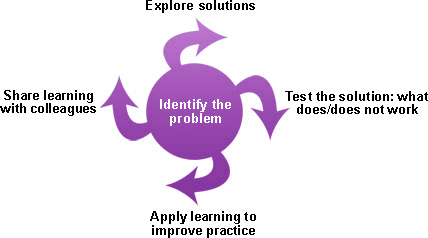Practical Science > Action research
Action research
If you are thinking about implementing changes to how practical work is planned and delivered at your institution, consider using action research.
What is action research?
Action research is normally small-scale and involves working collaboratively. It is a cyclical process that requires those conducting the action research to:
- reflect on and assess their practice;
- explore and test new ideas/methods/materials; and
- evaluate how effective their interventions have been.
In other words, the action relates to what you are going to change and the research relates to evaluating how effective interventions have been. The research often involves learner voice, before and after the intervention.
The outcomes and impact of the action research are shared with colleagues. Decisions can then be taken as to which innovations are adopted more widely by the team or organisation.
The action research cycle

Action research for practical science
In the Embedding Pedagogy in Practical Science project, 14 further education colleges carried out 21 action research projects, with the aim of supporting and disseminating effective practical work in the science classroom.
Most of the projects developed new or different practical experiences to improve learning of particular topics in their subject.
Improvements to knowledge and understanding as well as to motivation and interest have been achieved by introducing independent practical work opportunities and the use of modelling. Adapting questioning techniques, the development of worksheets, starters and plenaries and better instructions for practicals have helped to forge better links for learners between practice, theory and applications.
Alternative methods for assessing practical work using photo-editing software, verbal presentations and worksheets have also been developed and tested.
Practical work has been used as a focus for increasing retention between AS and A2 and for encouraging recruitment to science courses from partner schools.
Feedback from participating teachers and lecturers indicates that action research is a motivating and effective form of continuing professional development (CPD) because the research undertaken is relevant to local circumstance and situation.
Read the report to gain further ideas about how you could use action research to see the impacts achieved by making changes to practical work.
Activity
If you are considering an action research project on practical work, read Action research for improving teaching and learning. The action research plan in the document is a useful tool for getting started.

 Action research for improving teaching and learning
Action research for improving teaching and learning